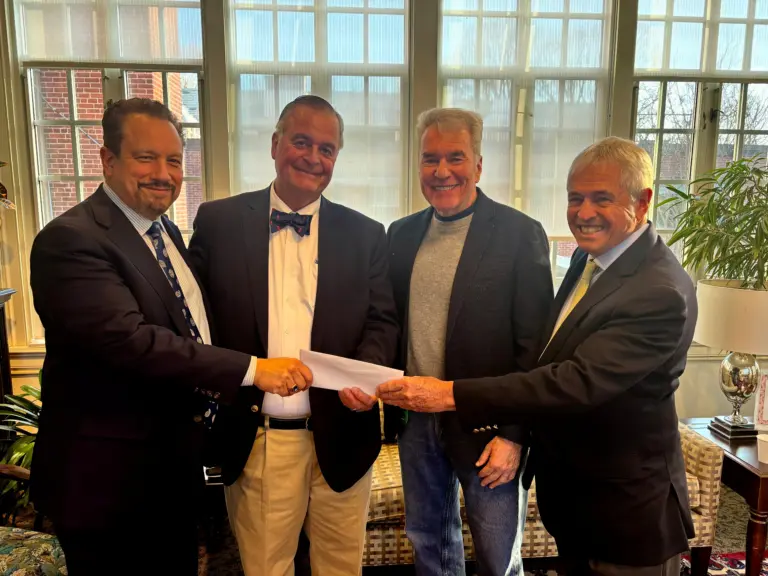By The Rev. Marek Zabriskie
Christianity is about making our life rich, expansive, and as wonderful as possible. It is not about shackling us with rules and guilt. When the latter occurs, it’s because Christianity has been misused.
After all, Jesus said, “I came that they might have life, and have it abundantly” (John 10:10). Likewise, an insightful second century theologian in Lyon, France, named Irenaeus, wrote, “The glory of God is a human being fully alive.” Joy is about becoming fully alive, which is God wants for each of us.
Jesus often spoke about the need to forgive. Without being able to forgive, we cannot experience the abundant life that God desires for us. For we humans are riddled with anger, selfishness, jealously, cruelty, and betrayal.
For us, forgiveness is not a luxury, but a necessity, if we want to experience joy in our lives. All of us have struggled to forgive someone in our lives. The key question is, “What power do we want the past to play in our present?”
When someone has hurt us in a very bad way, we get stuck. We struggle to move forward. Let me give you an illustration.
For the past decade, I have taken a pilgrimage each summer in Spain and walked one of the Caminos that lead to Santiago de Compostela, where James, one of Jesus’ twelve disciples, lies buried. Each year, over 300,000 people walk one of these Caminos. The Camino that I walked this summer starts in town of Le Puy-en-Velay in France, and ends over 1,000 miles later in Santiago de Compostela, Spain. I walked just a portion of it.
Many of us carried our own backpack. You are supposed to carry only ten percent of your bodyweight. I have a terrible habit of packing books to read. Each extra pound weighs you down, slows your progress, and can hinder you from enjoying the experience.
After ten days, my right shoulder hurt a lot. So, I contacted a service that transports backpacks and for nine euros a day they took my backpack from one lodging to the next.
Suddenly, I was walking freely and faster and enjoying the journey much more. When you and I refuse or struggle to forgive someone, it’s as if we have stuck that person in our backpack. We take them with us wherever we go.
They weigh us down, slow our journey, and rob the joy of making our journey. We struggle to enjoy the present, because we’re carting along the past. But when we forgive them, we set ourselves free and remove that enormous burden from our shoulders.
That’s why Jesus put forgiveness in the center of everything that he taught. It’s right there in the center of the Lord’s Prayer, “Forgive us our trespasses as we forgive those who trespass against us.” When Jesus encountered someone hurting or in need, he often said, “Your sins are forgiven.” He removed that enormous weight and set that person free.
When we cannot forgive or refuse to forgive someone, their presence hovers over us like a dark cloud. We feel diminished, angry, hurt, shamed, or stuck. Every step forward can be miserable and painful. It’s not the joyful, abundant life that Jesus promises us.
But before we attempt to forgive, we must be clear about what forgiveness is not. Forgiveness does not mean forgetting. Sometimes, it is impossible to forget and remembering protects us from being hurt again.
Forgiveness is not saying everything is alright, because it is not. Nor does forgiveness depend on the other person being sorry, because sometimes the other is unable or unwilling to recognize the harm that he or she has caused. We must forgive anyway for our own sake.
Forgiveness doesn’t mean there shouldn’t be punishment. People must be held accountable for their actions. This protects all of us. Forgiveness means that I may still be angry with you, but I refuse to stay trapped in my resentment, and I know that we both need God’s forgiveness. I want to move forward, begin with a clean slate and leave the rest up to God.
At the heart of forgiveness is a profound act of letting go. In Greek and Aramaic, which Jesus spoke, the words for forgiveness mean “to release,” “let go,” or “surrender.” When we forgive someone, we release our anger, rage, and hurt, and we let God’s peace and ceaseless love reclaim us.
Jesus urges us to confront the person directly. Too often we expect someone to recognize how they have hurt us and to come to us. We speak to others about the hurt that we have experienced but we fail to speak to the person who has hurt us face to face. If we try this and it fails, Jesus says to bring others from our church, school, workplace, or neighborhood to support us. There is leverage in numbers.
If this fails, Jesus says to tell the church or wider community. We protect others by establishing what is and is not acceptable. We have a responsibility to help shape our environment. If all of this fails, Jesus says that we may need to cut off contact with the person for no one has a right to injure us emotionally, psychologically, or physically.
This sounds simple, but it can be very hard and take lots of time. In her book Plan B, writer Anne Lamott describes the great struggle that she had to forgive her mother. “I prayed for my heart to soften,” she wrote, “to forgive her and to love her for what she did give me – life, great values, a lot of tennis lessons, and the best she could do. Unfortunately, the best she could do was terrible…And my heart remained hardened toward her.”
For the first two years after her mother died, Lamott kept her mother’s ashes in her son’s closest. But slowly she was able to move them to a corner in the living room. This was a major event. Jesus knows that forgiveness can take a great deal of time.
Lamott writes, “I don’t think [Jesus] was rolling his eyes impatiently at me while [my mother] was in the closest…I don’t think much surprises him: This is how we make important changes – barely, poorly, slowly. And still, [Jesus] raises his fist in triumph.”
On Monday, many of us gathered to mark the 22nd anniversary of 9/11 at the Cos Cob Memorial Park in honor of the 32 persons connected closely to Greenwich who died on 9/11. We gathered to remember. We did not forget. But we gathered also to let go so that we can move forward and embrace abundant life and joy. The bitter wound of hurt can only be healed through forgiveness. When we forgive a soul is set free, and it ours.
The Rev. Marek P. Zabriskie is Rector of Christ Church Greenwich and has trekked over 2,300 miles across Europe.




